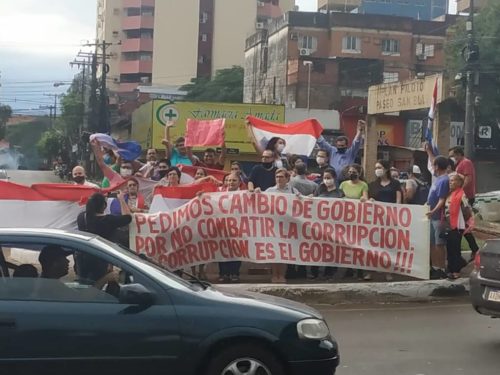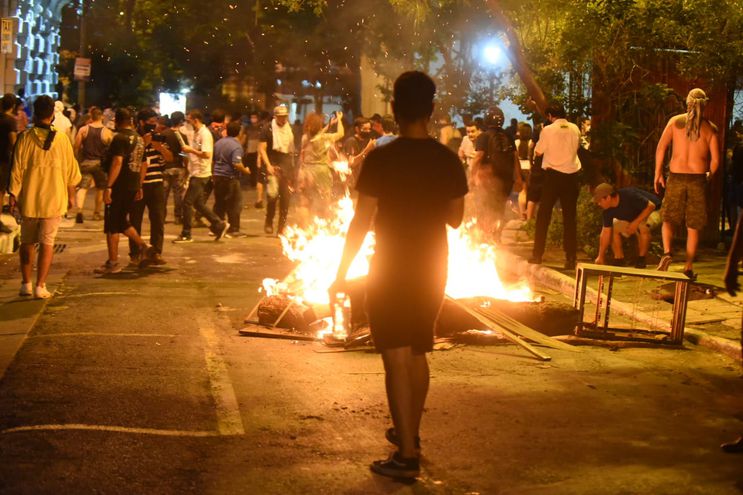Paraguay is witnessing a social explosion. Police repression of mass protests at the government mishandling of the COVID-19 crisis left one dead and 18 injured on Friday 5 March. Fearing the masses on the streets, President Mario Abdo forced the resignation of half a dozen ministers and offered dialogue. The masses have remained on the streets demanding that “they should all go” (“que se vayan todos”).
The landlocked South American country had initially taken harsh measures and managed to keep the pandemic under control. Then in July 2020, the Colorado government of Mario Abdo, under pressure from big business, decided to lift the quarantine measures, leading to a steady rise in infections. With the pandemic completely out of control in neighbouring Brazil, the hospital system in Paraguay is quickly running out of all sorts of supplies and ICU beds for COVID-19 patients and others.
In some cases, relatives of patients have had to provide their own supplies, bought at extortionate prices in the private sector. This includes even basic supplies like sedatives for those who need to be intubated. Families are spending 300 dollars a day on supplies and drugs. Many have had to sell goods and pawn items to face medical bills of up to US$9,000.
Corruption and profiteering in the allocation of contracts in the public health service have aggravated the crisis. Businesses linked to the ruling Colorado party were allocated contracts that they never delivered.
In the last three weeks, the COVID-19 crisis reached its peak, with over 300 patients needing ICU treatment. The health system has all but collapsed. The government also bungled the purchase of vaccines, which was aggravated by the advanced capitalist countries hoarding the available doses. Up until Friday, the country had only received 4,000 doses of the Russian Sputnik vaccine, a rate of 0.01 per 1000 people.
Last week, there were protests of doctors and health workers that led to a series of resignations in the public health service system, including the head of the National Respiratory Illnesses Institute.
In addition to the anger about the government’s handling of the pandemic, there is also pressure from the owners of the private transport system, who are threatening to increase their fares despite massive opposition from the public.
Mass protests
This combination of factors led to a mass protest on Friday in the capital Asuncion. Ahead of the protests, President Abdo asked his health minister Mazzoleni to resign, but that did not appease the peoples’ anger.
The demonstration had been organised spontaneously on social media under the slogan “I am for a Paraguayan March 2021”. This is a reference to the fact that several important political events in the country’s history, which saw the irruption of the masses on the streets, took place in March: the 1947 March revolution, the 1999 March rebellion and the movement of March 2017 against the attempt of the then-president Horacio Cartes to change the constitution to allow him to stand for another term of office.
Even though these events in history each have different features and political meaning, the idea that unites all of them is the masses taking to the streets to force change. This is what the people wanted when they came out on the streets en masse on Friday in an unprecedented demonstration of anger against the government.
Many were carrying the national flag and large groups of youth were wearing the colours of the national football team.
Social explosion in Paraguay. One dead and 18 injured after brutal police repression of massive anti-government demonstration in Asunción, against the government's mishandling of the pandemic pic.twitter.com/YLYETSwo7U
— Jorge Martin (@marxistJorge) March 6, 2021
Then, the government unleashed the riot police against the peaceful crowd, which included young and old, men, women and children, leading to clashes and rioting. Police used tear gas and rubber bullets. Protestors fought back and for a while they had control of the streets, with the police being forced to retreat. By the end of the night one person had been killed and 18 were injured. At one point, a section of the police ran out of anti-riot ammo and raised a white flag, completely over-run by the protesters fighting back.
El momento en que cascos azules levantan el pañuelo blanco, pidiendo tregua a los manifestantes#hoypy
— Diario HOY Paraguay (@hoypy) March 6, 2021
Imágenes @C9NParaguay pic.twitter.com/mQzYw9Th5e
As could have been predicted, the Minister of the Interior Arnaldo Giuzzio was quick to blame “Venezuelan agitators” for the violence, as have previously Moreno in Ecuador and Piñera in Chile when faced with mass protests and uprisings. The truth is that violence was provoked by the actions of the riot police, who charged against the peaceful crowd.
Feeling that the situation was getting out of control, on Saturday 6 March, president Abdo called for “tranquility” and offered the resignation of another three ministers. None of that stopped the protests on the streets. Thousands came out again in Asunción, now under the slogan “que se vayan todos, que no quede ni uno solo” (“they should all go, none should remain”). The protests on Saturday were again met with repression and arrests. None of this deterred the protesters, who came out again in large numbers on Sunday evening. The pressure on the government continues.
El sábado por la noche volvieron a salir miles a las calles de Asunción en el #MarzoParaguayo2021 después del estallido del viernes y la brutal represión. "que se vayan todos y no quede uno solo" esa consigna. 4 ministros cayeron ya. 🎥@majomartz pic.twitter.com/S2PzQ0uoZT
— Jorge Martin (@marxistJorge) March 7, 2021
Opposition lawmakers from the Liberal party started a process of impeachment (juicio politicos) but have not yet gotten the necessary amount of votes to proceed. There are also divisions and power struggles within the ruling Colorados, with the faction of former president Cartes moving against Abdo.
The Colorado party has ruled the country for the last 80 years (including 35 under the Stroessner dictatorship), with only a brief interlude when left winger Lugo was in power and then removed through impeachment. This is the main party of the ruling class and the current president Abdo has close links to the Stroessner dictatorship, his father having been a private secretary to the dictator. However, the Liberal party is also a capitalist party and the replacement of one by the other would not lead to any substantial improvement in the conditions of the masses of workers and peasants in Paraguay.
Stay on the streets! Bring down the government!
The character of the protests is a raw explosion of anger against all those in power and their criminal corruption, which has led directly to hundreds of people dying during the pandemic. But the movement has no clear idea of what it wants to replace those in power. The idea of a political trial (impeachment) is seen by many as a quick way of getting rid of Marito, as the president is nicknamed. However, if he were to be removed, he would be replaced by the vice president, which would not change anything.
Others, like the left-wing Frente Guasú, are demanding the resignation of the president and vice-president and new elections. They have also made a call to all “democratic and patriotic forces” to “permanent mobilisation” across the country and to develop “spaces of discussion”. It is clear that the demand for the resignation of the government and new elections (“in due course”) represents a clearer break with the current situation and would make it more difficult for Colorado factions to take advantage of the crisis.
 Down with the government, no confidence in the Liberals, the workers and peasants must govern. These should be the watchwords of socialists / Image: Resumen Latinoamericano
Down with the government, no confidence in the Liberals, the workers and peasants must govern. These should be the watchwords of socialists / Image: Resumen Latinoamericano
However, the Frente Guasú has then called on “all political, social and economic actors in the country to agree an economic recovery plan”. Who are these economic and political actors? Why is there a call to “all actors”? Does that include the ruling Colorado party, which is responsible for the situation? In practice they are calling on workers and peasants to join hands with capitalists in the name of “economic recovery”. The problem is that the economic crisis Paraguay is immersed in is the result of the capitalist system. The capitalists will want to make workers and peasants pay for the crisis, as they have already been doing.
The crucial point now is that the people must remain mobilised in the streets with a clear demand for the removal of the government. Mass assemblies should be organised in every neighbourhood, workplace and amongst the youth, in order to give the movement a more organised and coordinated character. We are talking here not just of a protest movement, but one which on Friday acquired insurrectionary features.
Socialist organisations must participate actively in the movement, as they are doing, but with a clear and independent programme on the basis of the interests of workers and peasants. Unfortunately, in the 2018 elections, the P-MAS participated in a broad alliance with the Liberals. Instead of class conciliation and national unity, they should advance a programme of class struggle. To fund the health service, expropriate the capitalist families linked to the Colorado and Liberal party. Down with the government, no confidence in the Liberals, the workers and peasants must govern. These should be the watchwords of socialists at the present time.
The social explosion in Paraguay is a continuation of the chain of uprisings in Latin America that started in 2019. We saw the red October in Ecuador in 2019, the uprising in Chile in October-December of the same year and the national strike in Colombia. That process was cut across temporarily by the pandemic, but returned with the uprising in Colombia against police violence in September 2020, the protests in Perú in November 2020 which brought down two governments, and the burning of the parliament building in Guatemala in the same month. Haiti has been in a constant state of mass mobilisation for nearly two years against the criminal and illegitimate government of Moïse.
The whole continent is a powder keg. In 2020 it has faced the deepest capitalist crisis in history with an across the region 7.7 percent contraction of GDP. Millions have lost their jobs and over 22 million have fallen under the poverty line. The stage is set for more explosions. What is required is a revolutionary leadership able to take the working class to power, at the head of all oppressed sections of society.

